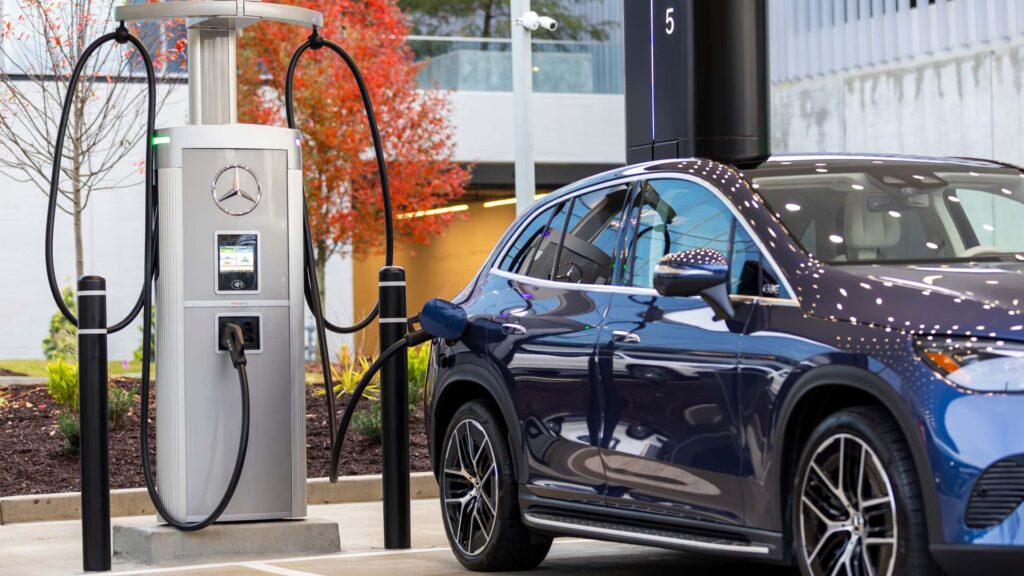The Chinese automaker BYD has made waves in the electric vehicle (EV) world with its recent announcement of next-generation electric cars that can accept a whopping 1,000 kilowatts of charging power. This means that drivers could potentially charge their vehicles in as little as five minutes for 250 miles of range. The news has left many in awe of the rapid advancements in EV technology.
However, not everyone is convinced that faster charging times are always better. Andrew Cornelia, CEO of Mercedes-Benz High-Power Charging, shared his thoughts on the matter during a recent interview on the InsideEVs Plugged-In Podcast. While he acknowledged the significance of BYD’s breakthrough, he also cautioned that faster charging may not always be necessary.
Cornelia pointed out that most mainstream EVs currently take between 15 to 40 minutes to charge at a DC fast-charging station, providing enough energy for a couple hundred miles of driving. He emphasized that the industry should focus on developing cars that can charge within the average dwell time for filling up a gas tank, which is around 10 to 12 minutes.
The key, according to Cornelia, is to make charging times align with the activities drivers are already doing. For example, when stopping for a coffee or a quick errand, a shorter charging time would be more practical than a super-fast charge. EVs have the advantage of being able to charge whenever they are parked, whether for a short stop or an extended period.
Cornelia also highlighted that extremely fast charging, such as 1,000-kilowatt charging, may not be necessary for all situations. For instance, charging at home or during a two-hour movie would not require such high power levels. Matching the charging time to the specific stop or activity is more important than simply aiming for the fastest charge possible.
Overall, while the automotive industry is making great strides in reducing charging times for EVs, it’s essential to consider the practicality and convenience of charging speeds in different scenarios. By focusing on making charging times more tailored to everyday activities, EV manufacturers can continue to make electric vehicles more accessible and user-friendly for consumers. With the rise of electric vehicles (EVs), the charging infrastructure is constantly evolving to meet the needs of drivers. One of the key considerations for EV owners is the speed and convenience of charging, especially when they are on the go. While traditional charging stations at coffee shops or other locations offer a 15-minute stop for a quick charge, the concept of five-minute charging is still limited in its practicality.
According to industry experts like Cornelia, there are only a few specific use cases where five-minute charging would make sense. However, companies like Mercedes-Benz are focusing on making charging stops as quick and painless as possible by deploying 400-kW stalls that can provide ample power for most EVs in the U.S. This high-power charging infrastructure is designed to minimize the time spent at charging stations while ensuring that drivers have access to the energy they need.
In addition to speed, the location of charging stations is also crucial for enhancing the overall charging experience. Mercedes-Benz has partnered with retailers like Starbucks and Buc-ee’s to place chargers at locations where drivers can engage in other activities while their cars charge. This strategic placement not only makes charging more convenient but also encourages EV adoption by integrating charging into everyday routines.
While the concept of five-minute charging may not be widely applicable at the moment, it showcases the future potential of EV charging technology. BYD’s recent announcement of ultra-fast charging capabilities has sparked interest in the industry, highlighting the possibility of delivering power at unprecedented speeds. This advancement underscores the importance of promoting the message that EV charging can be fast, efficient, and accessible in various use cases.
Overall, the evolution of EV charging infrastructure is driven by the need for faster and more convenient charging solutions. Companies like Mercedes-Benz are at the forefront of this innovation, focusing on high-power charging technology and strategic partnerships to make EV charging seamless and efficient for drivers. While five-minute charging may not be a reality for most EV owners yet, the progress in charging technology continues to push the boundaries of what is possible in the world of electric mobility.

